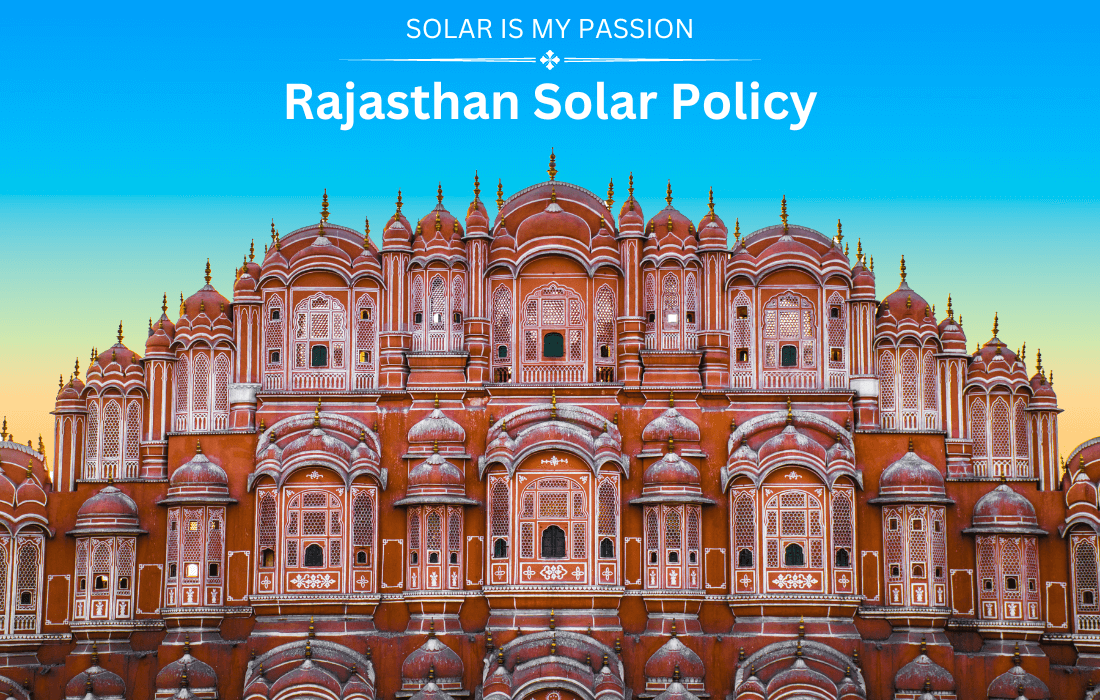1. Preamble
1.1 Growing concerns of global warming and climate change require emphasis on clean and green energy. The Renewable Energy sources lay foundation for planners in developing the policy framework to ensure energy security and equity along with achieving the goals of reducing carbon emission and pollution mitigation.
1.2. Utility scale power producers, small power generators, state utilities such as generation, transmission and distribution companies, regulatory and power management agencies, Government and consumers are major stakeholders in the Renewable Energy (RE) sector. This Policy is envisaged for facilitation of the stakeholders for promoting solar energy sector while safeguarding interests of the end consumer.
1.3. Renewable energy brings enormous benefits in the form of zero fuel cost resulting in electricity prices free from volatility and external influence, reduced water usage, low import bill, and pollution mitigation.
1.4. Over past several decades, demand for power ha s g rown and the S t a t e ha s added conventional power capacity on a large scale. The State has achieved self-reliance in availability of power. Furthermore, renewable energy has become commercially viable, the r e for e , s t a t e uti l iti e s and othe r stakeholders have increased interest and focus on renewable energy.
1.5. Sol a r ene r g y c an b e d e p loy e d in a decentralised manner which brings benefit of reduced transmission & distribution losses and savings in cost of establishing additional transmission infrastructure because of generation of power at load cent res. Decentralised generation through solar rooftop systems, off-grid applications and small solar power plants at consumers end are efficient ways of utilisation of solar energy.
1.6. On a life cycle basis, electric vehicles are environmentally cleaner than fossil fuel based vehicles. It is right time to push for a rapid transition of transport sector based primarily on electric vehicles, requiring further policy interventions to align electric vehicles charging by renewable energy based systems.
1.7. The State has vast and largely untapped potential in terms of intense solar radiation, one of the highest number of sunny days in a year and availability of vast barren/uncultivable unutilised government/private land. This has potential to make Rajasthan a highly preferred destination for solar energy at the global level.
1.8. To meet the global commitment Government of India, has fixed a national target of 175 GW Renewable Energy, which includes 100 GW from Solar Energy by the year 2022. This will reduce dependence on conventional sources of energy by promoting non-conventional energy sources.
1.9. In view of ambitious national projections of RE capacity addition, planning of transmission system is an important factor to facilitate scaling up of renewable energy. Transmission planning requires a new framework in terms of multi stakeholder process and a long-term perspective plan. Better structured RE procurement system can be created based on low generation cost and best value to the system.
1.10 Due to unpredictability and variability of Renewable Energy generation, its large scale integration to the grid is a challenging task. It requires upgradation of transmission and distribution infrastructure. This leads to increase in system level cost of RE which is to be borne by the state utilities and the government. Seamless integration of renewable power with grid to ensure grid stability requires deployment of technologies and implementation models for ancillary services.
1.11 Optimal generation capacity mix of renewable and conventional energy sources requires to be as ses sed by cons ider ing pos s ible technology options, to match the future demand curve and energy requirement with the generation profile of the State.
1.12 Open access consumers are one of the major stakeholders using renewable power to fulfil their energy demand as well as renewable purchase obligations. Therefore, challenges of such consumers are to be addressed through a suitable regulatory and policy framework.
1.13 To keep pace with the changing needs of the solar energy sector, State Government has decided to review the existing Rajasthan Solar Energy Policy, 2014.
Rajasthan is a land of resilient people. For centuries they have braved harsh geo-climatic conditions to shape themselves into one of the most vibrant and colorful cultures in the world. This land of blistering sun and vast tracts of barren land is now leading the green energy revolution in India.
Rajasthan’s solar generation potential has been assessed at 142 GW. The State Government plans to systematically harness this potential and has set for itself an ambitious target of 30 GW capacity by 2024-25 which will transform the energy scale of the state and the country.
Vision and Objectives of “Rajasthan Solar Energy Policy”
- To develop solar power sector in the State with “stakeholder-driven” policy.
- To be a major contributing State for achieving the national target of 100 GW capacity of solar energy as a part of the global commitment.
- To achieve an “optimal energy mix” of conventional and renewable power, ensuring energy security of the State, efficient grid management and protecting interests of all stakeholders.
- To promote new technologies in solar energy generation and storage to make solar energy more cost-competitive and reliable source of energy for consumers.
- To facilitate the development of infrastructure in the generation, transmission, distribution and manufacturing sector of renewable energy.
- Create a better atmosphere to innovate and invest for micro, small and medium enterprises for harnessing solar energy.
- Human resource development with particular reference to r renewable e energy and the generation of employment opportunities
- To facilitate and support research & development activities in the field of RE. Nurturing better products, processes and systems to promote the growth of renewable energy.
- To deploy ancillary services for making the grid flexible for RE Power integration by various modes like Demand Side Management, Time of Day Tariff, Scheduling & Forecasting, Storage Systems, Reactive Power Management, Grid Reserve/Balancing Capacity, etc.
Rajasthan Solar Subsidy2022: https://www.solarismypassion.com/blog-detail/Rajasthan-Solar-Subsidy
Rajasthan state empaneled vendor list: Click here to view list
Rajasthan DISCOMs Official Website:
Ajmer Vidyut Vitran Nigam Ltd. – https://energy.rajasthan.gov.in/content/raj/energy-department/rrecl/en/home.html
Jaipur Vidyut Vitran Nigam Ltd. – https://energy.rajasthan.gov.in/content/raj/energy-department/rrecl/en/home.html
Jodhpur Vidyut Vitran Nigam Ltd. – https://energy.rajasthan.gov.in/content/raj/energy-department/rrecl/en/home.html


